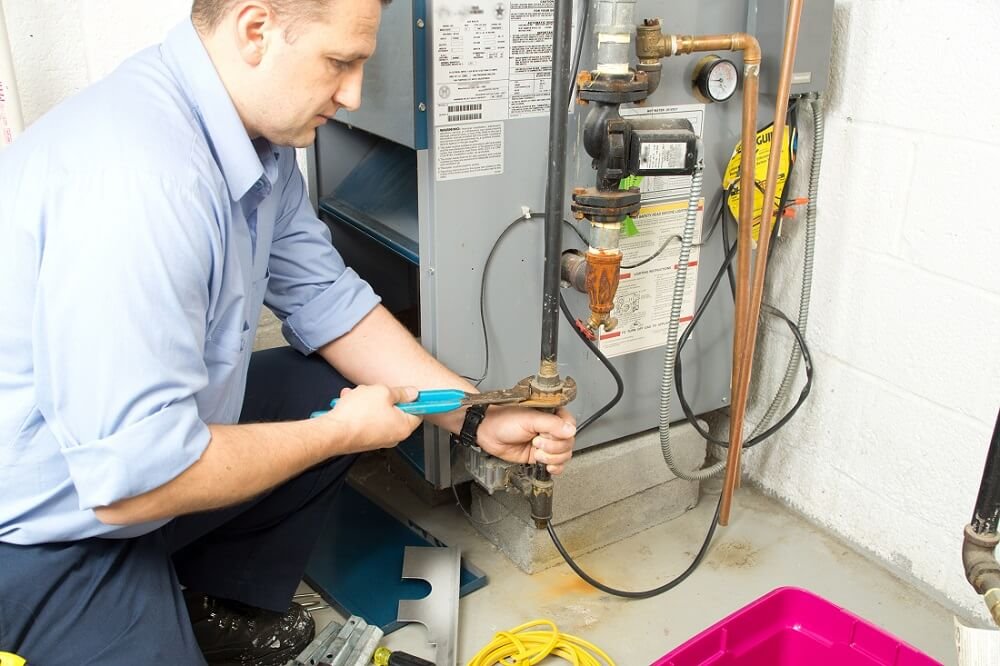Why Does Your Furnace Makes Loud Noise When Turning On?
 A furnace is an essential home appliance that provides warmth and comfort during cold seasons. But have you ever heard a loud, unexpected noise coming from your furnace when it turns on? A sound that is straight out of an old horror movie and makes you jump in surprise? It’s happened to many homeowners and can be startling. But what does this strange sound mean exactly? If your furnace makes noises when turning on, the cause could range from regular operation to something more serious.
A furnace is an essential home appliance that provides warmth and comfort during cold seasons. But have you ever heard a loud, unexpected noise coming from your furnace when it turns on? A sound that is straight out of an old horror movie and makes you jump in surprise? It’s happened to many homeowners and can be startling. But what does this strange sound mean exactly? If your furnace makes noises when turning on, the cause could range from regular operation to something more serious.
There are several reasons why a furnace makes loud noise when turning on, and understanding these can help you address the issue and prevent it from happening again. This article will discuss why furnaces make loud noises when turned on and give practical tips for resolving the problem.
Reasons Why Furnaces Make Loud Noises
Loose or Misaligned Parts
One of the most common reasons why furnaces make loud noises when turning on is due to loose or misaligned parts. When your furnace operates, the metal parts and components tend to expand and contract as they heat up and cool down. Over time, these movements can cause some parts, such as screws, bearings, and bolts, to loosen or shift from their original positions. As a result, they create rattling or clanking noises that can be quite disturbing.
Dirty Filter
A dirty air filter is one of the most common causes of loud furnace noise. The air filter captures dirt, dust, and other debris in the air before entering your furnace. When the filter becomes clogged or dirty, it restricts airflow, making your furnace work harder than it should and increasing the likelihood of noisy operation. To solve this problem, all you need to do is replace your air filter regularly.
Dirty Components
Another reason why furnaces make loud noises when turning on is due to dirty components. Over time, the furnace’s air filters and ducts can accumulate dust, dirt, and debris. When this happens, the airflow within the furnace becomes restricted, causing the fan or blower motor to work harder than usual. This increased workload can result in screeching or squealing noises from the furnace.
Worn-Out Parts
The wear and tear of furnace components are inevitable, especially if they are old or have not been maintained properly. When critical parts such as belts, motors, and bearings wear out, they can produce loud rumbling or grinding noises. If left unaddressed, these issues can lead to more significant problems and potentially cause severe damage to the furnace.
Malfunctioning Blower Motor
If you hear squeaking or squealing coming from your furnace, chances are that the blower motor has become worn out or damaged. It can be caused by age, lack of maintenance, or even debris accumulation inside the motor. If this is the case with your furnace, you must call an HVAC technician for repair or replacement services.
Faulty Fan Belt
A faulty fan belt can also cause loud noises in your furnace system. The fan belt connects the motor and blower wheel; when it becomes loose or frayed, it can create a lot of noise while running. Replacing a broken fan belt isn’t too difficult; however, if you’re uncomfortable doing so yourself, you should call an HVAC technician for assistance.
Tips on How to Resolve Loud Furnace Noises

Identifying the Source of the Noise
The first step in diagnosing and resolving loud furnace noises is identifying their origin. Several potential sources exist for these sounds, including the fan belt, blower motor, or even the air ducts themselves. If you can determine which part of your furnace is creating noise, it will be easier to decide what action needs to be taken to fix it.
Cleaning and Replacing Parts
Once you have identified which part of your furnace is causing loud noises, the next step is to clean or replace any worn or loose parts that may be contributing to the issue. For instance, if you find that your fan belt is causing noise due to wear and tear, replacing it should help quiet down any excessive noise from your furnace. Similarly, cleaning out any debris trapped inside your blower motor can also help reduce noise levels. Additionally, regularly checking and replacing air filters can also ensure optimal airflow through your system and prevent any buildup of dust or other particles that could lead to excess noise levels.
Tighten Loose Parts
One of the easiest ways to resolve loud furnace noises is to tighten loose parts. You can tighten any loose bolts, screws or bearings using a screwdriver, wrench, or pliers. Consider calling a technician to inspect and fix the issue if the noise persists.
Replace Dirty Components
If the cause of the noise is due to dirty components, replace the air filters and clean the ductwork. A dirty air filter can cause many issues, including poor airflow, reduced efficiency, and loud noises. Regularly cleaning your furnace’s components can prolong its lifespan and improve its overall performance.
Contact a Professional
If you cannot identify or resolve loud furnace noises, contacting a professional HVAC technician may be necessary to diagnose and repair any underlying issues with your system. A professional technician will have experience in identifying abnormal sounds coming from furnaces and will know best how to repair them efficiently so that they do not become more serious problems down the line. They can diagnose what’s wrong with your system quickly and recommend the best action for resolving any underlying issues once they have been identified.
Conclusion
In conclusion, loud furnace noises can be a nuisance, but they also indicate that something may be wrong with your furnace. Loose or misaligned parts, dirty components, and worn-out parts are the most common culprits of loud furnace noises. Understanding these reasons and implementing the above tips can help you resolve the problem and keep your furnace functioning optimally. Remember, if the noise persists or you’re unsure how to resolve the issue, it’s always best to call a professional technician to ensure your furnace works safely and efficiently.
